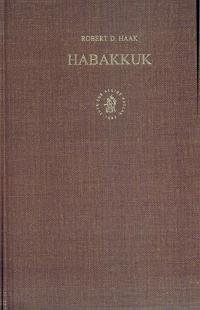
Ebook: Habakkuk
Author: Robert D. Haak
- Genre: Religion
- Tags: Old Testament Criticism Interpretation Bible Study Reference Exegesis Hermeneutics Judaism Religious World History Almanacs Yearbooks Atlases Maps Careers Catalogs Directories Consumer Guides Dictionaries Thesauruses Encyclopedias Subject English as a Second Language Etiquette Foreign Genealogy Quotations Survival Emergency Preparedness Test Preparation Words Grammar Writing Research Publishing Religion Spirituality Hebrew Sacred Writings
- Series: Supplements to Vetus Testamentum 44
- Year: 1997
- Publisher: Brill Academic Publishers
- Language: English
- pdf
Beginning with form- and text-critical examinations of the text of Habakkuk, this work examines the role of the prophet in the historical setting of late 7th-century Judah. It assesses the policies supported by Habakkuk during the debate surrounding the demise of the Assyrian empire and Judah's role in the new political situation. It provides a basis for examining the role of prophets in Judahite society.
This valuable study contains four carefully constructed chapters in which the form, content, and historical setting of Habakkuk’s prophecy are analyzed and the roles which Habakkuk and other prophets played within Judahite society are examined. In the first chapter, Haak surveys the early Hebrew manuscripts (mainly 1QpHab and the Murabbaˁat manuscript of the Twelve Prophets) and the versions of Habakkuk and concludes that "there is a basis for the textual study of Habakkuk within the consonantal tradition represented in the MT” (p. 7). He therefore adopts a text-critical methodology in which the consonantal tradition of the MT is given priority but in which emendation is considered legitimate if evidence from the manuscripts and the versions warrants. On the basis of present knowledge, Haak presumes that it is entirely possible “to arrive at an understanding of the text which is closer to the original historical setting than the understanding reflected in the present MT” (p. 10). Indeed, that is the goal of the following chapter ("Translation and Notes”).
This valuable study contains four carefully constructed chapters in which the form, content, and historical setting of Habakkuk’s prophecy are analyzed and the roles which Habakkuk and other prophets played within Judahite society are examined. In the first chapter, Haak surveys the early Hebrew manuscripts (mainly 1QpHab and the Murabbaˁat manuscript of the Twelve Prophets) and the versions of Habakkuk and concludes that "there is a basis for the textual study of Habakkuk within the consonantal tradition represented in the MT” (p. 7). He therefore adopts a text-critical methodology in which the consonantal tradition of the MT is given priority but in which emendation is considered legitimate if evidence from the manuscripts and the versions warrants. On the basis of present knowledge, Haak presumes that it is entirely possible “to arrive at an understanding of the text which is closer to the original historical setting than the understanding reflected in the present MT” (p. 10). Indeed, that is the goal of the following chapter ("Translation and Notes”).
Download the book Habakkuk for free or read online
Continue reading on any device:

Last viewed books
Related books
{related-news}
Comments (0)